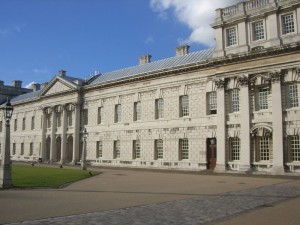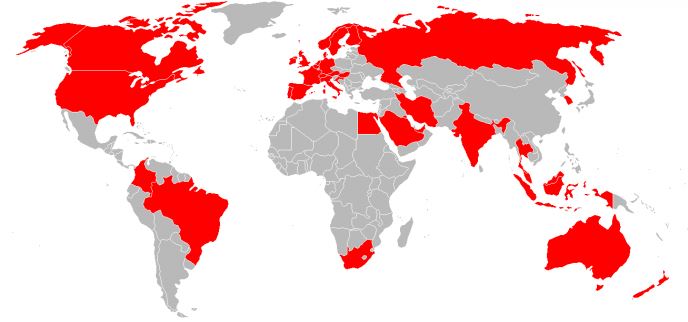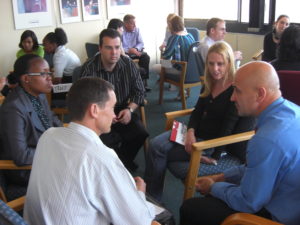It all began on September 5th, 2002, at the Strand Palace Hotel on the Strand in central London. Not far from Trafalgar Square. Eighteen people attended my very first Knowledge Café.
The idea for the Café had started to form in my head about the turn of the millennium. I used to attend a series of Knowledge Management talks called the Coffee Machine. Alumni organized these events from the City University Business School (now Bayes Business School).
These were typical of evening talks you might find in any large city. They were free, they lasted for about 45 minutes, and then there was time for Q&A. Finally, some of us would go to a local pub for a few drinks afterward.
Or at least, that was how it was supposed to happen. Many times it did, but more often than not, the evening turned out differently.

Often the speaker would have far too many PowerPoint slides. The talk would be somewhat dull, and they would overrun their speaking time, leaving little or no space for Q&A. It was death by PowerPoint.
At those sessions, what do you think was the best part of the evening? Yes, that’s right – the time spent at the pub afterward. Not for the drinking but the socializing and the conversation. I always thought that this was where the real learning took place.
Around the same time, I was also starting to attend KM conferences. In so many of these events, the organizers packed the speaking slots in tightly back to back. The rationale being that the more speakers they could pack in – the better it looked on the marketing material.
Forty minutes for a PowerPoint presentation, including the last ten minutes for Q&A. But like the Coffee Machine, far too many speakers ran over their time. And weak chairpeople would fail to manage them.
More often than not, the time would be made up by asking subsequent speakers to shorten their talks. This was grossly unfair. Or time would be taken out of the lunch and coffee breaks, thus reducing the opportunity for valuable networking.
It was serial death by PowerPoint!
I wanted to do something different, and the idea of a more conversational event started to take shape in my mind. It was an early design for the Knowledge Café.
At the time, I was aware of the World Café format but quite deliberately did not read about it.
This attitude may seem strange coming from a KMer (someone who practices KM), but I did not want to be unduly influenced, and I wished to think through and design a process based on my own experience.
There was a good reason for this. I took part in many facilitated workshops over the years in my corporate life and had largely found them ghastly affairs. The professional facilitators would be far too controlling, far too smug, and always seemed to love the sound of their own voice. OK, not all, but far too many.
And I am glad I did all of this as when I, at last, took the time to look at the World Café process and experience it, I found it had a lot in common with my Knowledge Café, and some fundamental differences might not otherwise have surfaced. And I learned to develop my own facilitation style that is less about facilitation and more about being a conversational host.
So my first Knowledge Café took place.
I ran another at the Strand Palace a month later in October, but when I came to run a third Café in December, I was told the room would no longer be available. So I emailed my community and asked if anyone could provide a free room. IBM, on the Southbank, came up with an offer.
Ever since I have never had to rely on a hotel or pay for a room – I have always found an organization or a partner who has been prepared to host one of my Open Cafés.

Over the next 12 months, I ran ten Knowledge Cafés in London, including a Knowledge barbecue, the first of many at the University of Greenwich. The Knowledge Café was established – there was no going back.
But it was a Knowledge Café in Zurich in 2006 that changed everything. At that Café, a light went on for me, and for the first time, I saw the real power of the Knowledge Café and conversation itself.
In 2008, I ran my first Knowledge Café masterclass in London, where I taught people how to design and run Cafés for themselves.
Since that first Café at the Strand Hotel in London in 2002, I have designed and run hundreds of Knowledge Cafés and masterclasses of all descriptions worldwide. I have also advised many people and organizations on how to take a more conversational approach to their work.
I have learned a great deal about culture’s role in conversation and appreciate its transformative power.
Today, the Cafés and the philosophy that underpins them are an integral part of my life. It is from my work of the past 20 years that Conversational Leadership is a product.

POST NAVIGATION
CHAPTER NAVIGATION
SEARCH
Blook SearchGoogle Web Search
The Gurteen Knowledge Letter is a free monthly newsletter with over 20,000 subscribers that I have been publishing by email for over 20 years.
Learn more about the newsletter and register here.


